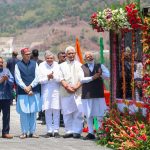 With an aim to create millions of jobs in India’s manufacturing sector, India’s Prime Minister Narendra Modi is preparing to launch the biggest overhaul of labour laws since the country’s independence.
With an aim to create millions of jobs in India’s manufacturing sector, India’s Prime Minister Narendra Modi is preparing to launch the biggest overhaul of labour laws since the country’s independence.
According to the Ministry of Labour and Employment, the government was looking to draft a bill for the upcoming parliamentary session that proposes to loosen strict hire-and-fire rules and make it tougher for workers to form unions.
The law, once approved by parliament and implemented, would be the biggest economic reform since India opened its economy in 1991. But the law is expected to attract a political backlash from the opposition parties and labour activists.
Rajiv Biswas, Asia-Pacific chief economist at IHS Global Insight, said Mr Modi had little option but to go ahead with the measures. “Without these reforms, the economy would stagnate, and frustrated investors would look elsewhere,” he added.
Since taking charge of Asia’s third largest economy in May last year, Mr Modi has taken several incremental steps to make labour laws less stringent for businesses, but the fear of a union-led political backlash stopped him from unshackling the labour market within Indian states. He let his party’s governments in Indian states of Rajasthan and Madhya Pradesh take the lead in this direction.
After a successful and peaceful implementation of the measures in these two states, India’s federal labour ministry now intends to replicate them at the national level.
Easier Hiring
As part of the proposed labour law, a factory employing fewer than 300 workers would be allowed to lay off workers without the government’s permission, but they will have to pay three times the current severance package. Currently, factories that employ 100 workers or more need approval from the government for layoffs.
Companies have long been demanding this type of law as governments rarely grant such permissions for layoffs, which makes it difficult to respond to business downturns and encourage them to stay small.
The planned changes would also make it tougher for employees to form unions or go on strike, but would make all employees eligible for minimum wage.
The bill is expected to be finalised in the next three or four weeks, and would then be sent to cabinet for approval.
According to the World Bank, India has one of the most rigid labour markets in the world. This has been a drag on the manufacturing sector, accounting for only 16 percent of India’s $2 trillion economy, in comparison to 32 percent of China’s.
Opposition parties have blocked Modi’s land bill in parliament, calling it “anti-farmer”. The labour reforms, which are being opposed by labour unions, could also end up being labelled as “pro-corporates”.
Author Profile
- India Writes Network (www.indiawrites.org) is an emerging think tank and a media-publishing company focused on international affairs & the India Story. Centre for Global India Insights is the research arm of India Writes Network. To subscribe to India and the World, write to editor@indiawrites.org. A venture of TGII Media Private Limited, a leading media, publishing and consultancy company, IWN has carved a niche for balanced and exhaustive reporting and analysis of international affairs. Eminent personalities, politicians, diplomats, authors, strategy gurus and news-makers have contributed to India Writes Network, as also “India and the World,” a magazine focused on global affairs.
Latest entries
 DiplomacyOctober 4, 2025UNGA Resolution 2758 Must Not Be Distorted, One-China Principle Brooks No Challenge
DiplomacyOctober 4, 2025UNGA Resolution 2758 Must Not Be Distorted, One-China Principle Brooks No Challenge India and the WorldJuly 26, 2025MPs, diplomats laud Operation Sindoor, call for national unity to combat Pakistan-sponsored terror
India and the WorldJuly 26, 2025MPs, diplomats laud Operation Sindoor, call for national unity to combat Pakistan-sponsored terror India and the WorldJuly 25, 2025When Fire Ends, Diplomacy Begins
India and the WorldJuly 25, 2025When Fire Ends, Diplomacy Begins India and the WorldJuly 16, 2025Operation Sindoor and its Aftermath: India’s Successful Diplomatic Outreach
India and the WorldJuly 16, 2025Operation Sindoor and its Aftermath: India’s Successful Diplomatic Outreach







